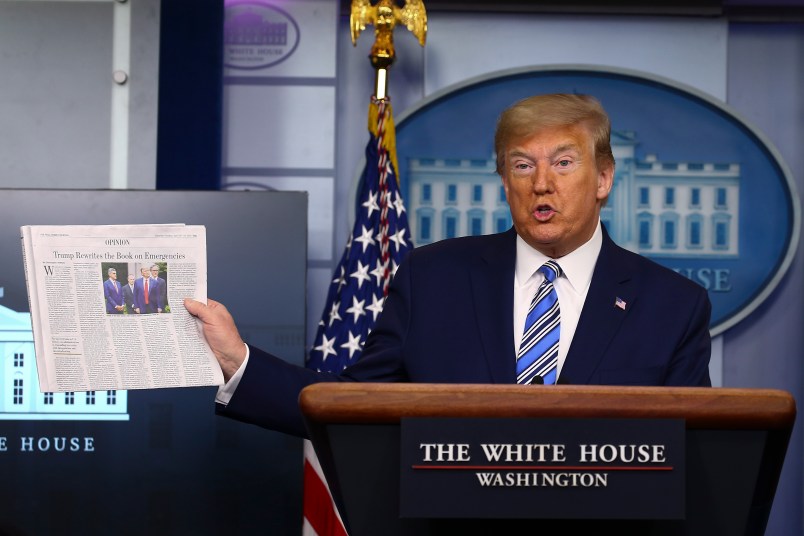In a Thursday night piece, the Wall Street Journal Editorial Board argues that President Donald Trump’s incitement of the mob that invaded and vandalized the Capitol Wednesday in an attempt to overturn the November election warrants his early departure from office.
The board advocates for the President to be removed through impeachment rather than through the invocation of the 25th Amendment, arguing that the latter “smacks of a Beltway coup” (despite the fact that it would definitely take Vice President Mike Pence’s cooperation, and possibly that of Trump’s own Cabinet secretaries).
They quibble, though, that Democrats are not “responsible” enough to handle an impeachment without alienating Republicans and making it into a partisan spectacle. They cite the last impeachment as proof of this fear — it’s the Editorial Board’s official position that the Russia probe was based on fully fabricated claims of collusion pushed by the FBI and fomented by the Clinton campaign to undermine Trump’s candidacy.
They conclude that Trump should resign gracefully, though they admit that he probably won’t.
One of the most striking things about the piece is the authors’ assertion that this behavior of Trump’s was predictable from the start.
“Mr. Trump’s many opponents are crowing in satisfaction that their predictions have been proven right, that he was never fit to be President and should have been impeached long ago,” they write. “But Mr. Trump’s character flaws were apparent for all to see when he ran for President.”
Indeed. But if that’s so, and if Trump’s incitement of a violent invasion of the Capitol was so foreseeable, the Board may want to admit that it coddled a massive blindspot where Trump is involved for the past four years.
1. “The idea that he’d lead some anti-democratic coup was always absurd” – WSJ Editorial Board, October 31, 2020.
That line comes from a piece about the election being a referendum on Trump. While the board acknowledges that Trump brings many of his electability problems upon himself with his temperament and narcissism, it also blames a “partisan press” and “bureaucracy” for “the most fanatical opposition of any modern President.”
The arrogant dismissal of what Trump was capable of this late in his presidency reverberates as Capitol Hill workers sweep up the debris and repair windows riddled with bullet holes.
2. “The least convincing Never Trump argument is that he would rampage through government as an authoritarian” – WSJ Editorial Board, November 6, 2016.
While the piece in question isn’t an outright endorsement of Trump — the board says that if it didn’t endorse even Ronald Reagan, for Chrissake, it’s not going to lift a finger for Trump or Hillary Clinton — it tacitly is. It ends by laying out the choice between the “very high” cost of “brute progressive government” under Clinton compared to “a gamble” on the “political unknown” of Trump.
Trump’s authoritarian qualities were clear even then. His distaste of the free press was evident from the beginning of his campaign, as was his readiness to go after the most fundamental linchpin of our democracy: our free and fair elections. Back in February 2016, Trump accused Sen. Ted Cruz (R-TX) of stealing the Iowa caucuses with “fraud” and called for a nullification of the result or a re-vote.
3. “This is one more example in which the claims that Mr. Trump would somehow hijack American democracy have been proven false. The President huffs and tweets but he never blows the country’s core institutions down” – WSJ Editorial Board, Dec. 13, 2020.
In this piece, the board is arguing for Trump to concede the results of the November election (with a healthy dose of whataboutism, somehow comparing Democrats’ qualms about Russian interference in 2016 to Trump’s day-in, day-out insistence that the election was rigged). But while giving rightful kudos to the plethora of judges who rejected Trump’s many, many election lawsuits, they also paint Trump as ineffectual.
But if Trump didn’t “blow the country’s core institutions down,” it wasn’t for lack of trying. Concerns about Trump’s attempt to hijack our democracy were absolutely well-founded, as he’s never stopped trying to do that. He was only stymied by the fact that President-Elect Joe Biden won by enough states to make Trump’s theft a much heavier lift, and that even very conservative judges declined to play along. And on Wednesday, the mob Trump-incited insurgents went fists-raised to the Capitol with the express intent to reverse the Electoral College certification of Biden’s victory. Trump has led or enabled every attack on the democracy — and may have succeeded if Biden’s win was slimmer.
4. “I have every expectation that Mr. Trump will be, act and speak like a great president should—win or lose” – Mick Mulvaney, WSJ opinion page, November 7, 2020.
This one is a bonus, written not by the Editorial Board itself but by Mick Mulvaney and housed in the same opinion section. The title of the piece is “If He Loses, Trump Will Concede Gracefully.”
Mulvaney resigned from his post as special U.S. envoy to Northern Ireland on Thursday. As part of his explanation for his resignation, Mulvaney said that Trump is “not the same as he was eight months ago.” But what about two months ago?







When you’ve lost the wsj. What is left?
I’m not sure any of the ding dongs who marched on the capitol read WSJ
Lindsay has completed his legacy. The files on him must be dripping.
Correct but their audience is much more upper crust. The donor class be bailing.